- Home
- Hughes, Rhys
Ten Tributes to Calvino Page 5
Ten Tributes to Calvino Read online
Page 5
A voice rasped, “Yes? Who is there? What do you want?”
“Do you have any room for a lost fable?”
“Are you playing a joke?”
“Absolutely not! It’s a simple question.”
“But don’t you know who I am? I’m a definitive selection of Aesop’s fables, the most historically prestigious of all such collections! Scholars have ratified my entire contents over generations and they can’t possibly be adjusted now. It’s beyond consideration!”
I didn’t bother arguing but moved along to the next book.
“Hello?” called another voice.
“Will you kindly take in this homeless fable?”
“No. I’m the Panchatantra, attributed to Vishnu Sarma and older than two thousand years. Your fable is not even of the correct ethnicity. Your request is ludicrous and perhaps offensive!”
I proceeded to the third book in the row but the outcome was the same. The fourth, fifth, sixth and seventh volumes were even more disdainful in their utter refusal to contemplate adopting the fable whose prosaic grip on my hand weakened with each rejection. The collection of fables gathered by the Roman writer called Hyginus at least had the common decency to offer apologies for his rebuttal of our plea.
His near contemporary, Phaedrus, was downright rude; but possibly I knocked a little too hard on his spine, which was breaking apart with age. These were very conservative and hallowed works and petitioning them to expand their table of contents was patently absurd; and yet I had given them free shelf space for many years and I had hoped one of them would be willing to overlook tradition if I asked.
True, the relatively obscure volume attributed to Vardan Aygektsi, the 13th Century Armenian fabulist, did deign to discuss the grim plight of the homeless fable with me for a few minutes.
“Does he feature animals, that vagrant of yours?”
I was stumped by his question. “I don’t know. Let me check. I haven’t actually read him yet, I’m afraid.”
“Humph! Then you’re hardly in a position to recommend him to me, are you? Well, hurry and find out!”
“Do you feature animals?” I asked the homeless fable.
“I don’t think so,” he replied.
“What do you mean by that?” I cried. “Don’t you know what happens in your own narrative? Impossible!”
“Fables aren’t in the habit of reading themselves.”
“But surely some of the characters inside your text can do the reading for you and let you know?” I persisted.
“Their eyes will point outwards, unless they turn around, and that will only happen if they are fleeing danger.”
“So there is no danger in your tale? That’s a start!”
“Or else no characters,” he added.
“A fable without any characters!” I groaned.
“Or possibly they do exist and they are in danger, but the danger is too great for them to stop and read anything. They are too busy fleeing,” said Vardan Aygektsi’s softly rustling pages.
I nodded at this suggestion; it was plausible.
“Whatever the facts, I cannot read myself,” insisted the fable.
I rubbed my chin furiously in response.
But his excuse was valid. So I finally decided to read him and find out the truth for myself. I was mildly shocked by what I discovered when I peered inside him, but I have a strong mental constitution and recovered my composure rapidly. I am not easily intimidated by self-referentiality, recursion, loops, twists and hyperspatial geometries; indeed, the house in which I dwell is a whitewashed tesseract.
“There are no animals inside you,” I declared.
Vardan Aygektsi snorted; perhaps the book was sneezing on its thick dust, in the same way that an octopus might tickle itself senseless. With a heavy heart, I led the fable away from the shelf of books. It was pointless continuing our quest here. The columns of untried fabulists retreated into the distance: Berechiah, Biernat, Krasicki, Lessing, De la Fontaine (most elegant of all), Samaniego, Florian, Krylov.
None would accept the homeless fable. I knew this.
As we returned to the kitchen, my hapless charge asked, “No animals at all? Not even human beings?”
“There is a man. Just one though,” I sighed.
“With inanimate objects?”
“Yes, you are that kind of fable,” I said.
“Do they speak in words?”
I nodded. “Yes, they do. In a contrived manner.”
“Spoons, chairs, clouds?”
“No, not them. I will explain soon.”
We reached the kitchen. I brewed more coffee. Then I sat the fable on my callused knee and began, “You are an example of what is often called metafiction. In other words you are a fiction that makes overt reference to its fictional status as an integral part of its own text. Indeed, you reference yourself in a tight loop. Your opening words are, ‘It’s high time I told you about a homeless fable I once knew.’ So—”
He blinked up at me. “What?”
I extended my hands in a gesture of surrender to fate. “In our present culture, there is no literary form more unjustly maligned than metafiction. Readers will say you are too clever for your own good; that you are smug and shallow, that you are merely showing off. Such insults won’t hurt less for being ill-judged. Your life will become a perfect misery. It’s my duty to protect you from that. I have an idea.”
He looked up at me and trembled, but there was strength in his gaze, a determination not to appear weak.
“I will embed you in a parable,” I declared.
“A parable?” he muttered.
“Yes, with a moral to the effect that we must be kinder to the products of metafiction, more considerate of self-referentiality. Parables are always about ordinary men and women, never animals or inanimate objects, and that’s how they differ by definition from fables; if you are embedded in a parable, the focus of your story will shift from you, a talking fable, to me, a man; a man who makes a plea for you.”
He looked uncertain. “Are parables comfortable?”
I slurped my coffee loudly, one of my talents. “They tend to be small and cramped, but don’t worry. The parable won’t be your home. You will live in the minds of the readers who read this story, the tale I am currently writing for you, the actual parable that is a vehicle to carry you from non-existence into living brains. The instant the parable is published you must be ready to leap out from the page…”
“Will I have a soft landing?” he whispered.
“Oh yes! Brains are spongy and will absorb the impact. You will find your new abode roomy and furnished with taste. You can ask for no finer home than the brain of a good reader.”
“At what point should I make the leap?” he asked.
“When they reach this point.”
“Now?” he babbled.
“Now!” I cried; and he sprang out…
…and landed in your consciousness. Did you feel him bounce off your synapses with a slight thud? I know that he’ll be happy there among your other thoughts, your memories and feelings. Your brain is one of the best to be found anywhere; thus I thank you from the top of the bottom of my heart. If I can ever return the favour, let me know. Regards to you! Please write your name in the following space.
Sunstorm
“A storm on the sun could take us back to the Stone Age.” — Alok Jha
Ug reached the top of the cliff and paused for breath, wiping drool from his chin with the back of a hairy hand. It had been a difficult climb and he was dehydrated as well as exhausted. But the cave mouth was ahead and he knew he would be able to rest inside.
The top of the cliff was broad and flat and almost perfectly circular, a mesa high above the savannah and its attendant dangers. A vast boulder stood in the centre of the mesa and this boulder was hollow, carved into a home by flint chisels, a task not so daunting as it may seem, for the stone was very soft and crumbly, easily worked.
In fact it wasn’t really a st
one at all, but a gigantic egg with a split in the side, laid by some monstrous flying reptile, and that split was the way into the cosy empty space, his own house.
A massive bear had occupied it originally but he had chased it out and away with thrown stones and sharp shouts.
Ug waited for his pulse rate to settle, then he loped toward the alluring entrance. His woman would be within, sewing skins into clothes, perhaps making a musical instrument from a tusk.
She wouldn’t be expecting him back until tomorrow.
He called out to her, “Ra-Kel?”
No answer. That was strange. She loved to sew skins into clothes and it was more than he could do to dissuade her from spending all her spare time on this work. Of her own free will, she never would have abandoned a task so satisfying and useful, unless—
She couldn’t have followed him without his knowing.
So she must be inside, surely?
“Ra-Kel?” he repeated, even louder.
He reached the entrance and peered inside but it took several moments for his eyes to adjust to the gloom. Ra-Kel wasn’t inside. Her work lay on the floor, trampled by dirty footprints.
Ug crouched and sniffed. The quality of the strange animal skins they had found on top of this mesa was high indeed. They had been attached to the shell of the egg by tough sinews when Ug and Ra-Kel first discovered them up here on this lofty refuge, seemingly waiting for them, a gift from the gods perhaps? The only explanation.
“Ra-Kel!” shrieked Ug. Then he listened carefully.
A faint voice reached him. “Ug!”
It came from outside the egg, from far away, thin and desperate, as if it belonged to a spirit or the wind, which probably were the same things. Ug rushed back out into the glare, shielded his eyes and gazed around. But he saw nothing, only the bare ground of the perfectly flat top of the mesa, no vegetation or cover of any sort anywhere.
The whisper came again, “Ug!”
Squinting, he tried to work out the right direction. Then he stumbled to the far edge of the mesa and looked down. At first he reeled from what he saw, the sheer drop, the immensity of height and space, but then he saw a dreadful outrage in progress. A theft.
A stranger was stealing his woman! A rival.
Halfway down the face of the cliff, the hairy brute had thrown Ra-Kel over his left shoulder and was climbing down with only his free hand and two legs, a tricky feat considering the unreliability of the handholds and footholds. Ug wailed and clenched his fists.
The stranger paused and looked up, his immense black brows visible even from this distance. It was Og! Og, whom Ug had once treated as a brother, whom he had pulled from a quicksand after he had been chased by a sabre-toothed tiger into a swamp…
“Og!” bellowed Ug ferociously.
“Ug!” mocked Og as he flashed his teeth upwards.
“Ra-Kel!” shrieked Ug.
“Ug!” answered Ra-Kel, her tiny fists pounding the back of her captor but with no discernible effect at all.
Ug was frantic with frustration and worry, with intense concern for his mate and for his own honour. Shooting pains riddled his pride, biting him like mosquitoes. He had to rescue her! How? He thought about dropping a rock onto Og’s head and splitting his treacherous skull, but then Ra-Kel would be loosed into the immensity of death.
He had to climb down and confront Og on the ground. An idea jumped into his mind, almost as if it was an edible animal, and he trapped it there, examined it, grinned with the joy of the catch.
Running back to the egg, he entered and fumbled in the yolky shadows for the coiled sinews, his fingers closing on them, extracting five from the hiding place like the innards of an endless pig. He loped back to the edge of the mesa and looked over the side again.
Og was making slow progress. He still had far to descend.
Ra-Kel was whimpering softly now.
Ug tied the five sinews together to make a rope.
Frantically looking around, he located a projection of rock that stuck itself out a few inches into the void. He tied one end of the rope around it with a knot his father had taught him and then he dropped the tangle and watched it unwind, the far end striking the dusty ground with an audible slap ten seconds later. A mythical snake.
Taking a series of deep breaths, Ug abruptly pushed himself into space and dangled. His large hands clutched the sinew and burned as they slid down and for a terrifying moment he thought he wouldn’t be able to stop himself from sliding all the way to the bottom at a speed comparable to a fall. He gripped tighter and braked slightly.
Then he worked out that if he wrapped one of his legs around the rope, he could control his descent even more accurately. He passed the level of Og and snarled at him. Og jerked his head up with a frown but Ug already was below him, the pain of his blisters truly forgotten in the swelling and joyful fury of triumph that suffused his being.
His feet struck the ground with a force that jarred the bones in his hips and he keeled over, grimacing through the agony until it began to fade, to become a comfortable ache, like a frost burn.
The sun flared high overhead. That huge yellow ball had been in a bad mood lately, flinging arcs of fire over itself. Ug could almost hear the sun hissing in the sky as it cast shadows with very sharp definition from every solid object, including himself as he stood up.
He bunched his fists and waited for Og to reach the ground.
“Ra-Kel!” screamed Ug in anticipation.
“Ug!” she responded as she came lower, still on the left shoulder of an ugly brute, a treacherous rival, a predator…
Og jumped the final few feet, landing upright.
Ug bared his teeth and charged.
To Ug’s amazement, Og didn’t brace himself to absorb the impact but turned and ran. He was fleet of foot, even with a woman on his shoulder, and easily outpaced his pursuer. Ug was vaguely aware of the entrance to a cave at the base of the mesa that passed in a blur as he forced himself to increase his speed. He howled in frustration.
But his ululation achieved nothing.
Og didn’t race off across the plain, but circled the massive outcrop, the mighty cliff, keeping close to the root of the sandy rock. Panting, Ug held his aching side and found his vision blurring.
But he didn’t give up. He bit his lip, tasted blood.
The sun beat down in boiling waves.
Sweat made Ug’s eyes smart, as if nettle juice had been squeezed into them, and he wiped both with a hairy forearm. He staggered, the bloated bursting sun seeming to pulse inside his head. Loops of fire leapt from the surface of that relentless orb, chiding tongues of unbearable energy. With a sickening gasp, Ug turned the next corner.
He had completely circled the mesa…
Back to the spot where he had descended; and Og was waiting for him and so was Ra-Kel, but the result was hideous.
Og had made a noose from the end of the long sinew, the rope that Ug had used to descend from the top of the cliff, and had placed it around the neck of Ra-Kel. He was holding the woman up in his burly arms and Ug knew that if he let her go, Ra-Kel would hang.
Ug didn’t know what to do. If he attacked Og, then his woman would choke to death. If he ran to help her, Og would take the opportunity to kill him while he was distracted. He stood still.
But Og made the decision for him. He let Ra-Kel go.
Her scream was cut off, turned into a gargle as the noose tightened and she dangled in mid-air, her feet a few inches above the ground. Og moved aside and beckoned at Ug, mouthing obscenities. Ug ran at him like a bull and Og danced nimbly aside, laughing.
He was standing near the entrance to that other cave, Og was, and with his hands on his hips he was grinning at Ug, mocking him, while Ra-Kel kicked ineffectually in her death throes.
Then something large rushed out of the cave.
A bear! The bear from above…
Ug was sure it was the same beast that he had chased out of the egg. It must have climbed safely down the
cliff, using its claws to grip the stone, moving into this new home, making a life for itself here; but always ready to take revenge on humans, those who had evicted it, persecuted it, hurt it with the sharp edges of broken pebbles.
Og didn’t have time to turn, to see what form his death had taken. The bear broke his neck with a single swipe.
Ug ran to help Ra-Kel. Then the sun stopped spitting.
Everything lurched, faded, congealed.
The sinew snapped. Ra-Kel sprawled to the ground, to the sidewalk, a pavement of neatly fitting slabs. Ug crouched over her. “Are you alright? I think the sunstorm has finished now…”
Ug remembered the way things really were.
The mesa was a skyscraper. An experimental rocket had landed on the flat roof and the chimp inside had managed to open the capsule hatch and escape. Here it was now, lurking in the shadows of the lobby entrance. It made a series of rude gestures at Ug.
The parachute fabric, the cords attaching it to the capsule. Everything had been interpreted differently, hadn’t it? The chimp had been a bear. It wasn’t possible, was it? Just because a violent solar storm had jammed all the communications satellites in orbit…
The man on the ground stood and dusted off his suit.
“Oglethorpe!” bellowed Ug.
“Yes, it’s me. The solar storm is over.”
“It was a quick Stone Age, thank goodness. I suppose we’d better get back to work now,” said Mr Ugolino.
Mr Oglethorpe nodded. They both glanced at Raquel.
She rubbed her bruised throat.
“We ought to file a report about this too.”
“Later. The accounts take priority. The auditors are arriving tomorrow and there can’t be any irregularities.”
She nodded. Then she squinted. “Was it painful?”
“Being killed by a bear? You bet!”
They went inside the building and took the elevator to the top floor. A mammoth that was slow to change back lumbered past them in the widest corridor, knocking over the water cooler.
“The sun regularly has Earth-sized storms on its surface that end up ejecting dangerous radiation and particles into space. Mostly these dangerous bits of energy head off into deep space. But what would happen if the Earth got in the way? You could kiss goodbye to the Internet and your electricity supply. Banks and governments would not be able to function. Satellites would be blinded.” — The Doomsday Handbook

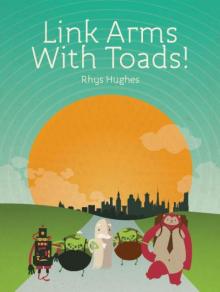 Link Arms with Toads!
Link Arms with Toads!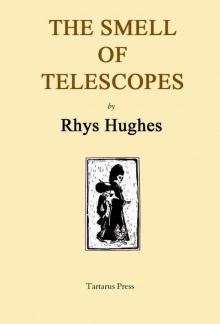 The Smell of Telescopes
The Smell of Telescopes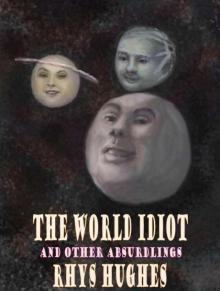 The World Idiot
The World Idiot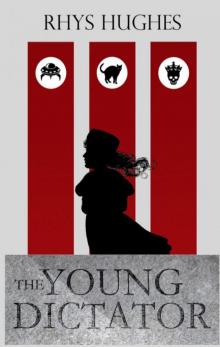 The Young Dictator
The Young Dictator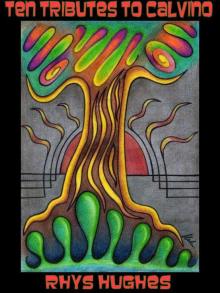 Ten Tributes to Calvino
Ten Tributes to Calvino